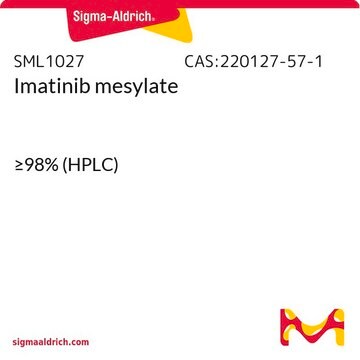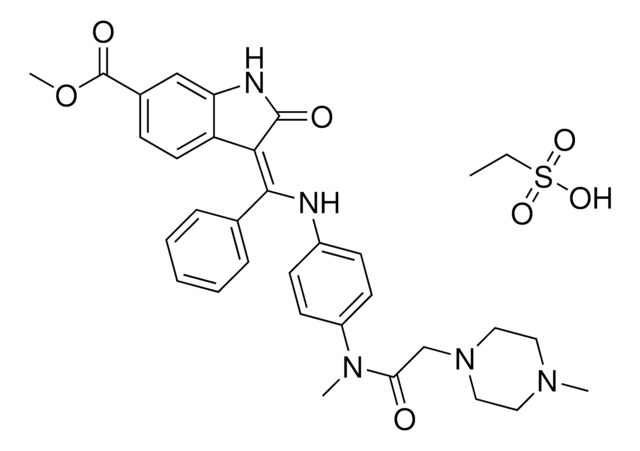SML2848
Nintedanib
≥98% (HPLC), powder, VEGFR, PDGFR and FGFR inhibitor
Synonyme(s) :
(3Z)-2,3-Dihydro-3-[[[4-[methyl[2-(4-methyl-1-piperazinyl)acetyl]amino]phenyl]amino]phenylmethylene]-2-oxo-1H-indole-6-carboxylic acid methyl ester, (Z)-3-[(4-{Methyl-[2-(4-methylpiperazin-1-yl)acetyl]amino}phenylamino)methylene]-2-oxo-2,3-dihydro-1H-indole-6-carboxylic acid methyl ester, BIBF 1120, BIBF-1120, BIBF1120, Methyl (Z)-3-(((4-(N-methyl-2-(4-methylpiperazin-1-yl)acetamido)phenyl)amino)(phenyl)methylene)-2-oxoindoline-6-carboxylate
About This Item
Produits recommandés
product name
Nintedanib, ≥98% (HPLC)
Niveau de qualité
Pureté
≥98% (HPLC)
Forme
powder
Couleur
white to beige
Solubilité
DMSO: 2 mg/mL, clear
Température de stockage
2-8°C
Chaîne SMILES
O=C(NC1=C2)/C(C1=CC=C2C(OC)=O)=C(C3=CC=CC=C3)\NC4=CC=C(C=C4)N(C(CN5CCN(CC5)C)=O)C
Actions biochimiques/physiologiques
Mention d'avertissement
Danger
Mentions de danger
Conseils de prudence
Classification des risques
Acute Tox. 3 Oral - Eye Dam. 1 - Repr. 2 - Skin Irrit. 2 - STOT RE 1
Code de la classe de stockage
6.1C - Combustible acute toxic Cat.3 / toxic compounds or compounds which causing chronic effects
Classe de danger pour l'eau (WGK)
WGK 3
Point d'éclair (°F)
Not applicable
Point d'éclair (°C)
Not applicable
Certificats d'analyse (COA)
Recherchez un Certificats d'analyse (COA) en saisissant le numéro de lot du produit. Les numéros de lot figurent sur l'étiquette du produit après les mots "Lot" ou "Batch".
Déjà en possession de ce produit ?
Retrouvez la documentation relative aux produits que vous avez récemment achetés dans la Bibliothèque de documents.
Notre équipe de scientifiques dispose d'une expérience dans tous les secteurs de la recherche, notamment en sciences de la vie, science des matériaux, synthèse chimique, chromatographie, analyse et dans de nombreux autres domaines..
Contacter notre Service technique










